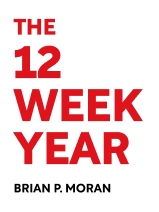

This article is an excerpt from the Shortform book guide to "The 12 Week Year" by Brian P. Moran. Shortform has the world's best summaries and analyses of books you should be reading.
Like this article? Sign up for a free trial here .
What is The 12 Week Year book about? How do the authors challenge the annualized goal-setting approach? What alternative do they propose?
In The 12 Week Year, the book’s authors challenge the conventional approach to goal setting and execution that is based on annualized thinking—where execution plans are aimed at attaining yearly results. Further, they propose an alternative approach that is based on the principle of periodization— achieving yearly results within a three-month timeframe.
Keep reading to understand the premise behind Brian Moran and Michael Lennington’s book The 12 Week Year.
The 12 Week Year: Book Premise
In your personal and professional lives, you tend to set goals based on an annual plan of attack. New Year’s resolutions begin in January and aim to create the desired change by the end of the year. Likewise, organizations set productive goals annually and tend to do annual reviews of their progress. This view is called “annualized thinking” and actually hinders your progress.
In the New York bestselling book The 12 Week Year, Brian Moran and Michael Lennington challenge the traditional annualized approach and offer a better alternative based on the principle of periodization.
Periodization: Fast Track to Success
When you embrace periodization, you change your long-term year-long plans of attack to shorter periods focused on maximizing one important skill at a time.
When you truncate your annualized plan into three months, your deadline is always in sight, so you lose the mantra of “there’s still plenty of time” and get busy immediately. If you have a slow week, you might be able to make it up the following week, but you know you can’t have too many bad weeks if you’re going to be successful at the end of 12 weeks. This mindset makes every day important and the need to produce results every week vital.
The other benefit of the 12-week year is the relaxation and celebration you look forward to after all your hard work. You now have four opportunities to reflect on your achievements and take a few days off to recharge. And when you come back, you have a fresh slate to begin another 12 weeks of heightened activity. If your first 12 weeks didn’t work out as you’d hoped, you don’t have to wait another year to see whether you’ve improved. The next 12 weeks are an immediate opportunity to attain better results or build on the momentum of your previous success.

———End of Preview———
Like what you just read? Read the rest of the world's best book summary and analysis of Brian P. Moran's "The 12 Week Year" at Shortform .
Here's what you'll find in our full The 12 Week Year summary :
- How to create a structured plan to rapidly accomplish goals
- Why annual goals don't work
- How to create urgency by working in 12-week increments






